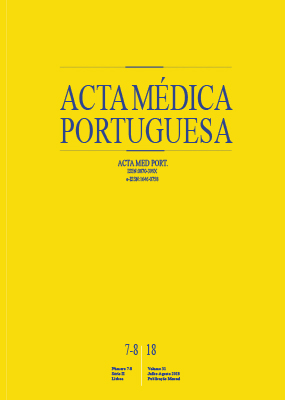Translation and Validation of the Patient Activation Measure in Portuguese People with Type 2 Diabetes Mellitus
DOI:
https://doi.org/10.20344/amp.9072Keywords:
Diabetes Mellitus, Type 2, Patient Participation, Patient Satisfaction, Portugal, Quality of Health Care, Self Care, Surveys and Questionnaires, Translations, Validation StudiesAbstract
Introduction: Management of diabetes mellitus is largely dependent on patients’ active participation in care. The ‘Patient Activation Measure 13’ assesses patients’ knowledge, skills, and confidence in self-care. We aimed to translate, culturally adapt, and validate the ‘Patient Activation Measure 13’ to Portuguese, in people with type 2 diabetes.
Material and Methods: The translation and cultural adaptation occurred in six phases. A convenience sample of people with type 2 diabetes was recruited from the waiting rooms of a diabetes outpatient centre in Lisbon, between March and April 2014. The questionnaire was self-administered; medical records were reviewed to obtain glycated haemoglobin levels. Main statistical analyses were based on the Rasch rating scale model.
Results: The response rate for the final questionnaire was 76%. Rasch analysis was conducted on 193 respondents. Respondents had a mean age of 67.1 (SD 10.1) years, 42.7% were women, and the mean patient activation measure score (0 - 100) in the sample was 58.5 (SD 10.1). The sample was low to moderate in terms of activation: 40.4% were low in activation (levels 1 and 2), 49.7% were in level 3, and 9.8% were in level 4, the highest level of activation. All items had good fit and the response categories functioned well. Item reliability was 0.97 and person reliability was between 0.77 (real) and 0.83 (model).
Discussion: The ‘Patient Activation Measure 13’ was translated and culturally adapted to European Portuguese and validated in people with diabetes, showing good psychometric properties. Future research should aim at evaluating test-retest reliability of the Portuguese ‘Patient Activation Measure 13’, and exploring its ability to measure changes in activation over time.
Conclusion: The ‘Patient Activation Measure 13’ is now available in European Portuguese and has good psychometric properties.
Downloads
Downloads
Published
How to Cite
Issue
Section
License
All the articles published in the AMP are open access and comply with the requirements of funding agencies or academic institutions. The AMP is governed by the terms of the Creative Commons ‘Attribution – Non-Commercial Use - (CC-BY-NC)’ license, regarding the use by third parties.
It is the author’s responsibility to obtain approval for the reproduction of figures, tables, etc. from other publications.
Upon acceptance of an article for publication, the authors will be asked to complete the ICMJE “Copyright Liability and Copyright Sharing Statement “(http://www.actamedicaportuguesa.com/info/AMP-NormasPublicacao.pdf) and the “Declaration of Potential Conflicts of Interest” (http:// www.icmje.org/conflicts-of-interest). An e-mail will be sent to the corresponding author to acknowledge receipt of the manuscript.
After publication, the authors are authorised to make their articles available in repositories of their institutions of origin, as long as they always mention where they were published and according to the Creative Commons license.









